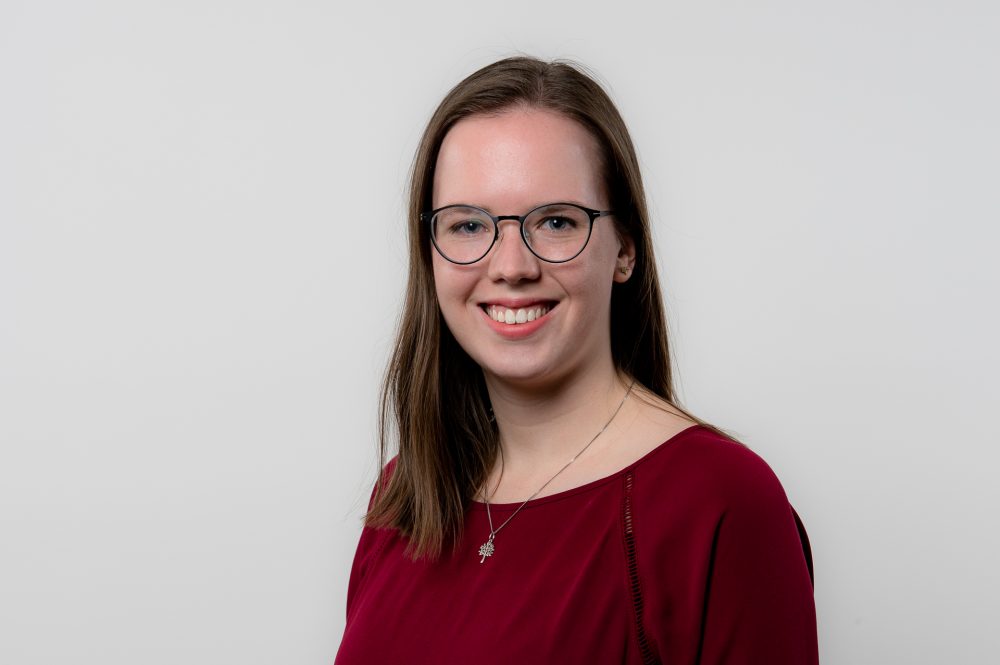Commencement for UConn Health students is May 8. Meet the UConn Graduate School programs at UConn Health commencement speaker Emily Fabrizio-Stover, 26, from Greenwich, Connecticut. She is a graduating Ph.D. student in biomedical sciences in the Neuroscience department at UConn School of Medicine.
Q: Why did you choose UConn Graduate School and what drew you to UConn Health?
A: When I was first looking at graduate schools, I knew I was interested in neuroscience research, but wasn’t sure exactly what I wanted to do. The umbrella program at UConn Health was appealing to me because it had the flexibility to try new areas of research. Also, I appreciated that the environment wasn’t intensely competitive and focused on learning.
Q: Did you have a favorite professor, class or part of the curriculum?
A: My favorite class was Systems Neuroscience, because as part of the class we were able to study human anatomy. It made the anatomy really click for me and it was really cool to see what I had previously only seen in diagrams.
Q: What activities were you involved in as a student?
A: I am involved in the Graduate Student Organization in multiple positions over the years, including as a yearly representative and currently neuroscience representative. I have also been involved in the Neuroscience Program Committee, Student Behavioral Health Committee, Student Wellness Committee, and Young Explorers in Science. I’m very passionate about improving mental health resources for the graduate student community.
Q: What’s one thing that surprised you about UConn?
A: My undergraduate university was very small, so I was surprised at how big UConn is and how many students there are.
Q: Any advice for incoming students?
A: It’s very easy to limit yourself based on what you believe others think of you. I’ve talked to a number of incoming graduate students that believe they won’t be able to work in the lab they want because they don’t have experience in techniques that lab uses. That is most definitely not true. Good professors will understand that you can learn anything if you’re able to think critically and logically, which if you’re in a graduate program, you can do. So don’t limit yourself based on your past experience!
Q: What’s one thing everyone should do during their time at UConn?
A: Go to a UConn ice hockey game at the XL center in Hartford. Tickets are free if you are a student and it’s a lot of fun!
Q: What will always make you think of UConn?
A: Whenever I see a husky, I think of the UConn mascot Jonathan the Husky.
Q: What or who inspired you most to enter health care and/or this field?
A: I’ve always been interested in neuroscience because at its roots is a study of how we as human beings work and because there are so many unanswered questions. I’m interested in auditory neuroscience in particular because sensory information is how the brain interacts with the world around it and the auditory system is complex so that many things can go wrong with damage and with time.
Q: What did you love most about your experience here at UConn Health?
A: I really enjoyed becoming more competent as a researcher. I also enjoyed interacting with all of the supportive individuals at UConn Health, both within and outside of my department.
Q: What’s it like to be part of UConn, and the significant impact its public service has on the state’s health, workforce and its people?
A: It’s been really great to see UConn Health’s positive impact on health and I’m proud that I can participate in it.
Q: What’s it going to be like to finally walk across the stage and get your graduate degree this May?
A: It’s going to feel really great knowing that the past five years I have worked really hard to make my impact on the field of auditory neuroscience and that my mentors believe that I have reached a point where I deserve to call myself a doctor.
Q: What’s next after UConn?
A: A post-doc position at the Medical University of South Carolina investigating how auditory processing changes with age. My ultimate goal is to continue to work in academia and teach and continue to inspire love for research in the next generations of scientists.



